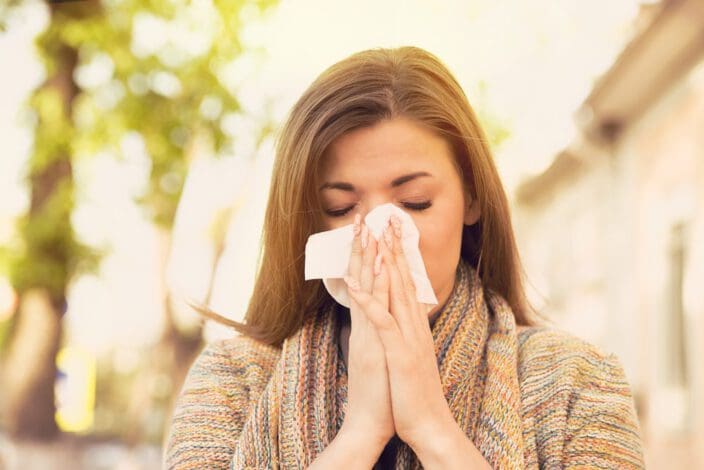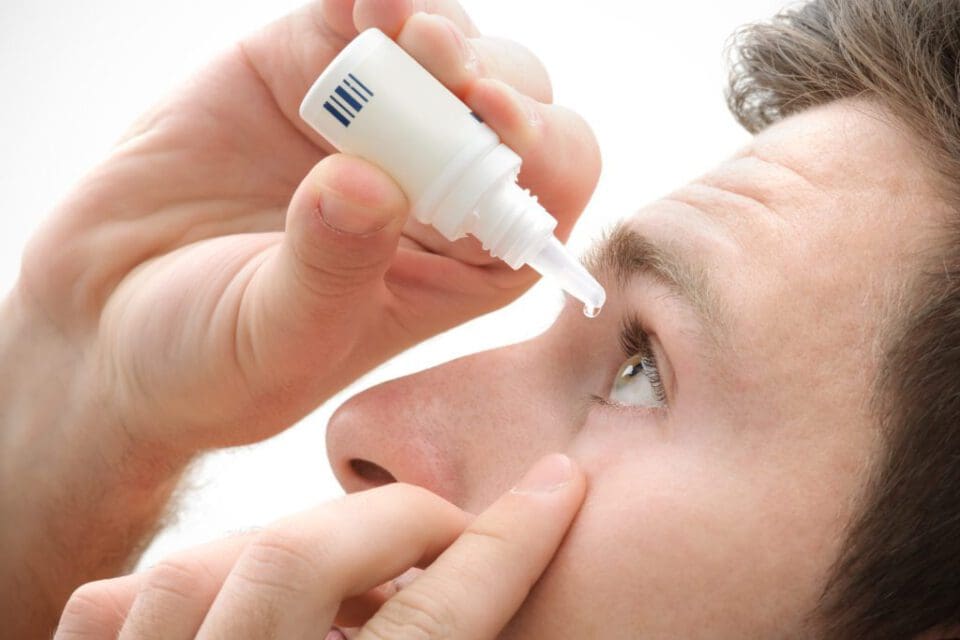Why Are Your Eyes So Itchy? (& What to Avoid Doing)
Home / Eye Health and Preventive Care /
Last Updated:
Wondering why your eyes are so itchy? Most of the time, your eyes are itchy because of seasonal allergies. Certain irritants may also play a role. And in some cases, eye strain may cause itchiness.
Table of Contents
The extent of the itchiness can vary greatly. It can be quite severe for some people.
Your doctor can help you determine what is causing the itchiness if you aren’t able to pinpoint the answer on your own.
Once you get a diagnosis for what is causing your itchy eyes, your doctor can determine the proper treatment. For more severe cases, prescription eye drops may be given. These usually reduce the histamine response, so itching related to allergies is reduced.
There are also things you can do at home for itchy eyes. Over-the-counter eye drops or lubricants can improve overall comfort.
Why Are My Eyes So Itchy?
Here are some of the most common reasons why your eyes are itchy:
Allergies

In most cases, an irritant or allergen is to blame for your eyes being itchy. Examples include dust, pollen, and animal dander.
When these substances are present, the tissues that surround the eyes experience a histamine response. This results in your eyes becoming red, swollen, and itchy.
Types of allergies that can cause eye itchiness include:
- Pet allergy. Some people have allergies that are always present, such as an allergy to pet dander.
- Pollen allergy. Other people experience seasonal allergies, such as an allergy to pollen during the spring and summer seasons.
- Food allergy. If your eye itchiness only appears when you eat certain food, you may be allergic.
- Drug or product allergy. If you wear contact lenses, it is possible to develop an allergy to the solution you use. Other products that may cause allergic symptoms around your eyes include artificial tears, creams and lotions, makeup, and soaps.
While allergies are the biggest culprit, other issues can cause your eyes to itch, such as meibomian gland dysfunction and dry eye syndrome.
Meibomian Gland Dysfunction
Meibomian gland dysfunction is relatively common. It is characterized by a meibomian gland abnormality or blockage that prevents sufficient oil from mixing into your tears. The result is excessive eye dryness.
Dry Eye Syndrome
Dry eye syndrome can cause a variety of uncomfortable symptoms.
- Burning
- Aching
- Eye fatigue
- Dryness
- Light sensitivity
- Itching
- Heaviness
- Soreness
- Redness
- Blurry vision
- Watery eyes
- Feeling like something is in your eye
There are several possible causes of this syndrome.
- Heavy digital device use or reading
- Prolonged contact lens wear
- Certain medications, such as diuretics, birth control pills, allergy medicines, or beta blockers
- Certain health issues, such as arthritis, Sjogren’s syndrome, diabetes, and lupus
- Frequently being in a dry environment
- LASIK surgery
- Diets that lack essential fatty acids
- Tear-producing gland dysfunction
Infections
Infections affecting the eyes can also cause itchiness as a symptom. Conjunctivitis, or pink eye, is one of the most common. Discharge and pinkness of the eye are common symptoms. The eyes may also itch.
Uveitis is another infection that affects the colored part of the eye. In addition to itching, light sensitivity and pain can occur.
When an eye infection is present, it is imperative to see a doctor. They will determine if a virus, bacteria, or fungus is the cause. Once diagnosed, the proper treatments can be administered.
Infections can be dangerous. For example, without effective treatment for uveitis, severe complications like cataracts, glaucoma, or vision loss are possible.
Blepharitis
Blepharitis is another possible cause of itchy eyes. It is characterized by the oil glands getting blocked. These glands are at the base of the eyelashes. Besides itching, swelling and watery eyes are possible with this inflammatory condition.
Eye Strain
If you work on screens a lot, you may experience eye strain that can cause eye itchiness. This is commonly referred to as computer vision syndrome. It can also occur after extended time on tablets and smartphones.
The itchiness is usually temporary and will go away once you give your eyes a break from screens. Aim to look away from your screen at least every 20 minutes for at least 20 seconds. Avoid holding screens too close to your eyes, and limit overall screen time when your eyes are itchy and irritated.

Medical Treatment Options
The appropriate medical treatment depends on the cause of your itchy eyes. Once you identify the offending allergy, it is easy to determine which medications may be beneficial.
- For allergies: Allergy ointments and eye drops are commonly prescribed. There are also over-the-counter options available, depending on which medicines the doctor determines are best for you. Some people benefit from nasal sprays for allergies. These include nasal antihistamines and steroid sprays. These are generally recommended when you have eye allergy symptoms and issues affecting your upper respiratory tract, such as nasal congestion and sneezing. A doctor can prescribe these treatments.
- For dry eyes: If dry eyes are to blame, lubricating eye drops are commonly used, as they alleviate dryness. Once the eye has more moisture, it is less likely to itch as much. For some people, lubrication is not enough. In these cases, topical cyclosporine A may be prescribed. This works to increase the production of tears for further hydration of your eyes.
- For an infection: If an infection is present, the doctor will determine the pathogen that is causing it. Oral or topical antifungal drugs or antibiotics will be given to kill the fungus or bacteria that is behind it. These may be given along with other treatments, such as corticosteroids, to treat the infection and alleviate the associated symptoms.
- For eye strain: Rest your eyes, and avoid screens for a couple hours. Don’t forget to blind often, as you are less likely to blind when looking at screens.
- For other eye conditions: For more complex eye conditions that cause itching, such as atopic or vernal keratoconjunctivitis, more intense treatment might be necessary. Treatment usually begins with topical mast-cell stabilizers and antihistamines. If these do not produce results, you may need immunomodulators or topical corticosteroids. Some people benefit from having steroid injections.
Self-Care Measures

Keep your eyes clean and remove any crust and debris that accumulate. Gently using a soft washcloth and cool water is the easiest way to do this. Do not rub hard.
If there is something in your eye, see a doctor. Trying to remove a foreign object from your eye on your own could result in issues, such as corneal abrasion.
Never rub your eyes when they itch. This can cause further irritation that could actually increase how much your eyes itch. Instead, used eye drops and ointments that work to alleviate the itching.
If you have allergies, work to avoid exposure whenever possible. This can help to reduce the eye symptoms you experience because of allergies. Your doctor can perform testing to help you identify which allergens are causing your symptoms so you can limit exposure.
For some people, cool compresses can be helpful. Wet a clean washcloth with cool water, and apply it to the itchy eye for 15 to 20 minutes at a time.
If you use cool compresses, do not apply them right after putting topical treatments into your eyes. This could remove some of the medicine, so you are not getting the full dose. Ideally, wait about an hour after using eye drops or ointments before you use a cool compress.
Itchy eyes can be uncomfortable to deal with. If basic self-care measures do not alleviate the itching, see a doctor for a proper diagnosis and the right treatment plan.
You deserve clear vision. We can help.
With 135+ locations and over 2.5 million procedures performed, our board-certified eye surgeons deliver results you can trust.
Your journey to better vision starts here.
References
- The Allergic Eye: Recommendations About Pharmacotherapy and Recent Therapeutic Agents. (August 2020). Current Opinion in Allergy and Clinical Immunology.
- Rethinking Meibomian Gland Dysfunction: How to Spot It, Stage It and Treat It. (July/August 2011). American Academy of Ophthalmology.
- Dry Eye Disease. (March/April 2018). Home Healthcare Now.
- Types of Allergies. (October 2015). Asthma and Allergy Foundation of America.
- Allergic Conjunctivitis. (August 2020). University of Florida Health.
- What Is Blepharitis? (November 2018). American Academy of Ophthalmology.
- The Itchy Eye: Diagnosis, Management of Ocular Pruritis. (February 2010). American Academy of Ophthalmology.
- Computer Vision Syndrome. Cedars Sinai.
This content is for informational purposes only. It may have been reviewed by a licensed physician, but is not intended to serve as a substitute for professional medical advice. Always consult your healthcare provider with any health concerns. For more, read our Privacy Policy and Editorial Policy.
